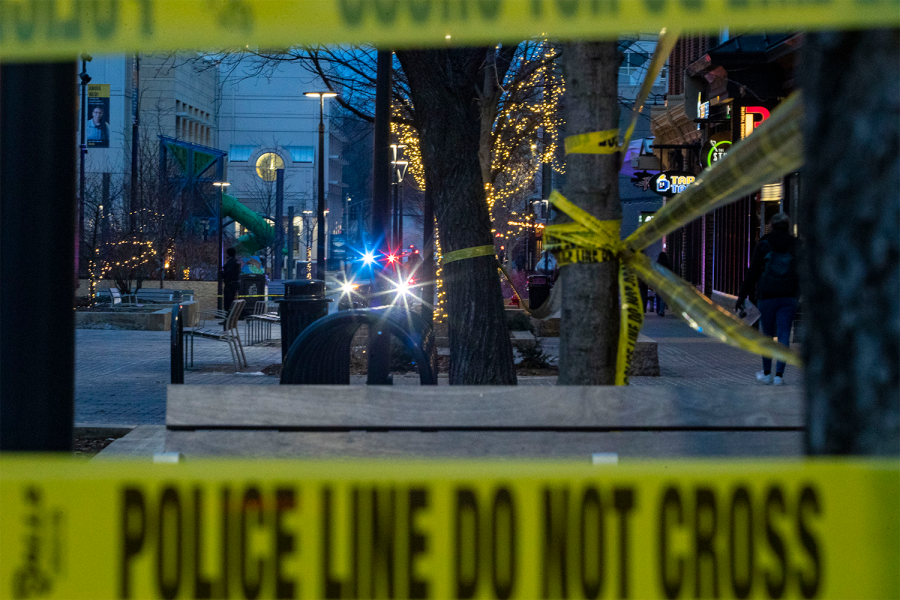Opinion | Gun violence is a public health concern
The psychosocial impacts of increased gun violence are impacting all U.S. communities.
A police car sits near the entrance of Brother’s Bar and Grill after reports of shots fired near the Pedestrian Mall in Iowa City, Iowa on Saturday, Jan. 14, 2023. No one was injured and officers were able to detain the shooter.
March 21, 2023
Gun violence needs attention before more lives are lost or indirectly impacted by lethal firearm use.
Gun Violence Archive counted 9,075 gun-related deaths in 2023, as of March 20. While this number is already too high, reports of gun violence never include the number of lives changed for every individual indirectly harmed by gun violence.
If the psychological and social effects of gun violence on American communities are considered as important as protecting the right to carry, there is no choice but to pursue stricter regulations on gun ownership, usage, and concealed carry licensing in Iowa.
The BBC reported 19,000 U.S. gun related deaths in 2020 — a 34 percent increase from 2019 and the most violent year for gun related deaths since 1985. 2020 was the most violent year for gun related deaths since 1985.
The Pew Research Center noted this number is the total number of gun related deaths, but it does not consider population growth. The year with the highest rate of gun deaths per 100,000 people in the U.S. was 1974.
Another gap in these statistics is that those numbers report only people directly affected by gun violence. But for each life lost, there are family, friends, and community members negatively impacted by the aftermath of a shooting, suicide by gun, or other lethal encounter with a firearm.
The Education Fund to Stop Gun Violence notes people may experience symptoms of post-traumatic stress disorder, anxiety, and depression and may develop sleep problems, intrusive thoughts, or personality changes in response to experiencing gun violence directly or through knowing someone who was directly affected.
It is important to recognize that gun violence does not affect us all equally. White, cisgender men are most likely to be gun owners, while communities of color, LGBTQ+ communities, and other marginalized groups are most likely to be victims of gun violence.
Communities at risk may experience negative social and psychological effects of gun violence even if they are not directly impacted. The idea that “I could be next” based on identity, gender expression, or demographics does not require a personal violent event to acknowledge that living one’s life authentically may make one a target.
Bills targeting transgender Iowans and diversity efforts in public schools send a message that marginalized communities are not welcome in this state and deserve little protection from violence. This places a larger target on the backs of individuals who are already at greater risk of harm compared to their straight, cisgender, white peers.
Some solutions include investing in community intervention programs, researching effective methods for dispelling the idea that guns solve interpersonal problems, and utilizing mental health services trained to communicate the risks of guns to at-risk communities — especially youth.
Hospital-based intervention programs connect gunshot or stab wound victims to social workers or therapists to discuss how retaliation is not a form of justice. Outside of hospital settings, studies show cleaning up abandoned areas, creating greener communities, and reducing the sale and consumption of alcohol lower gun violence rates.
Partnering with law enforcement is also an option. In Oakland, California, the city’s Ceasefire Program brings together individuals and groups known to engage in gun violence with police, who educate them on how violence impacts their community members. Participants are also taught alternative methods to violence to meet their needs and achieve personal goals.
There are many reasons a person might support increasing regulations for gun usage and ownership. Decreasing the rate of self-harm by guns, keeping at-risk communities safe from mass violence, and protecting the mental health of children are just some of them.
Columns reflect the opinions of the authors and are not necessarily those of the Editorial Board, The Daily Iowan, or other organizations in which the author may be involved.














